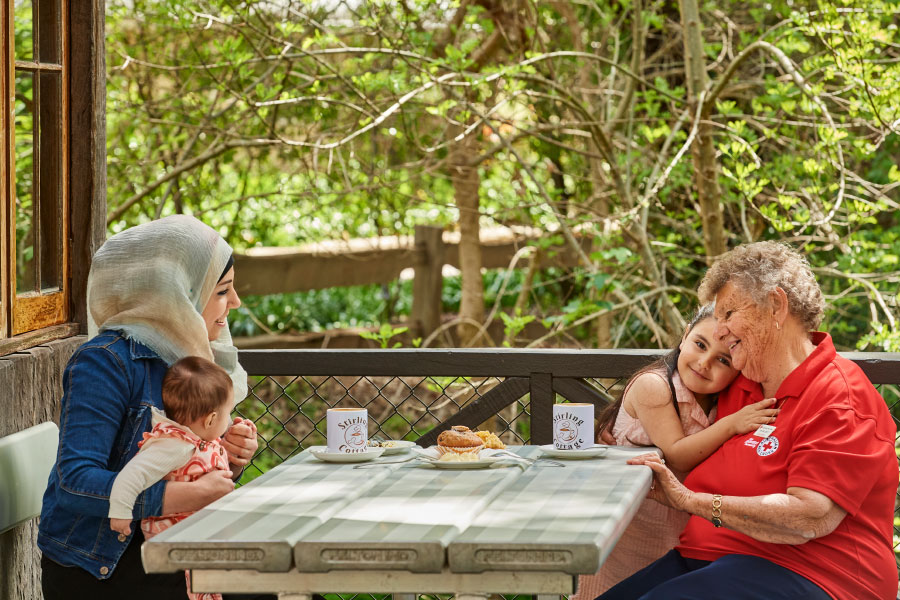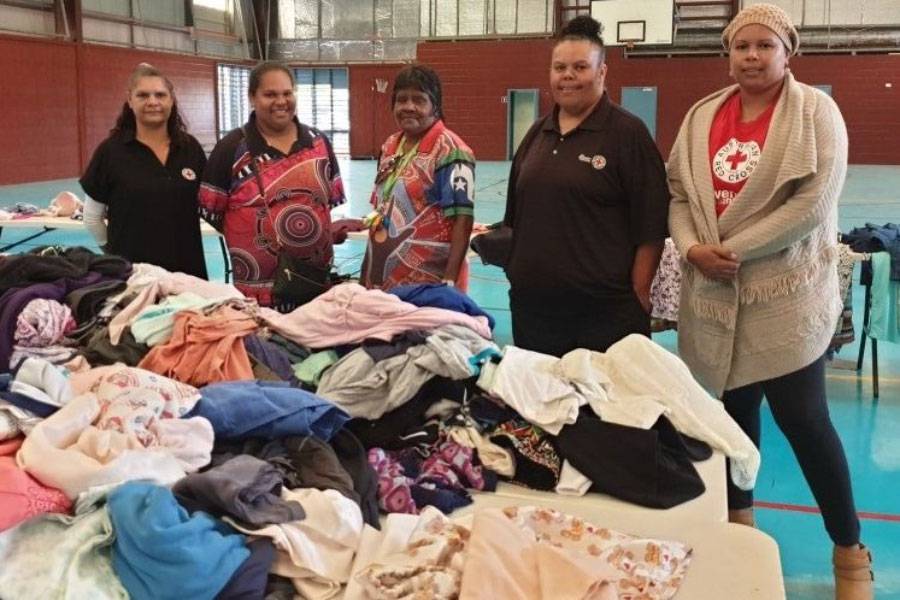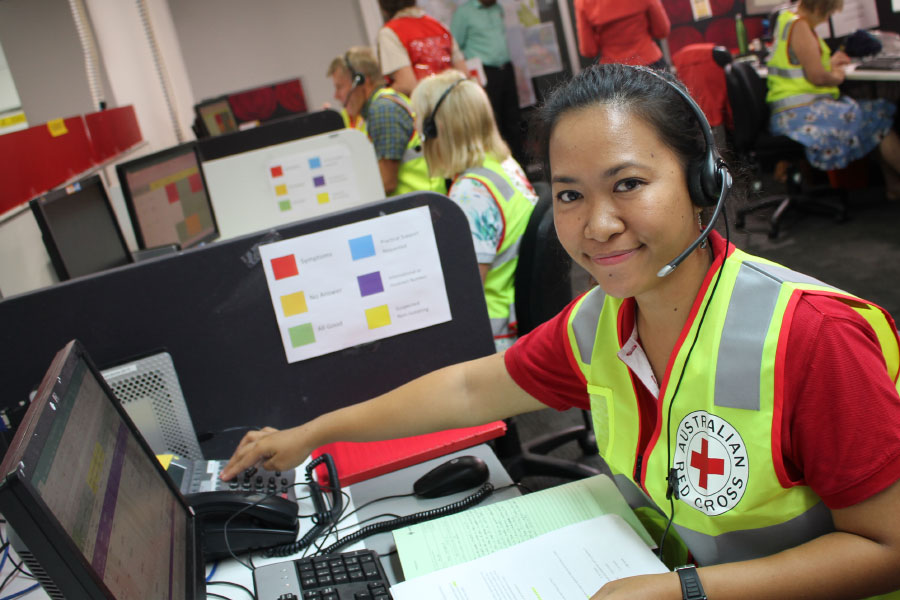Supporting refugees, people seeking asylum and migrants in vulnerable situations
In the past year we worked with 36k migrants in transition and their families. We also supported more than 10,000 people in schools and communities nationwide to create a more welcoming Australia for newly arrived migrants and refugees.
We helped 4k refugees to settle in Australia, and 40% of these were children, supporting people to connect with communities, access health and other services, undertake training and secure employment.
We expanded our ‘Safety Net’ to support thousands more people on temporary visas, as well as new migrants, refugees, and people seeking asylum, and who had lost work, couldn’t work, or couldn’t return home due to COVID 19. We’ve engaged with the federal, state and territory governments, influencing policy and leading to better access to healthcare and increased support. We significantly scaled up our co-designed safety net to reach more than 14,000 migrants who did not have access to mainstream supports. With our partners we provided food to over 6000 people through food parcels and reached over 115,000 people with critical referral information and translated health information in 18 languages.
We have embedded our Connect Match Support employment program in QLD and piloted the Safety Net in SA. Partnerships with social enterprises and businesses led to paid work, connections and new skills for more than 950 people.

Since arriving from Syria on a refugee visa, young mother Laurine and her two daughters and husband have been welcomed into the small town of Harvey in WA by Red Cross volunteer Jan Willmott. Photo: Frances Andrijich
In collaboration with the University of NSW, we released the first findings of a ground-breaking long term study on the impact of visa uncertainty on people seeking asylum and refugees. We also released a report on our work on human trafficking.
Our bi-cultural Community Health Program assisted over 1500 newly arrived migrants in TAS to understand the local health system and the Multicultural Youth Orientation Program (MYOP) helped over 1300 young migrants who are accessing our schools for the first time.
Our aim to reach more children with In Search of Safety Sessions to support a welcoming Australia was challenged by remote learning during the pandemic. We were able to move some sessions online, including a high-profile session co-delivered by Craig Foster and Hakeem Al-Araibi.
Humanitarian Observer teams spent 165 working days monitoring conditions in immigration detention and conducted 1035 in-depth interviews with people in immigration detention. Visits to immigration detention facilities were not possible during the pandemic but we increased our phone outreach to people in detention to continue monitoring activities.
We sought to trace 2,337 people to restore family links broken by conflict, disaster or migration. We achieved outcomes in 193 cases and enabled 116 family news messages to be exchanged between separated family members.
Walking alongside Aboriginal and Torres Strait Islander peoples
Our relationships with Aboriginal organisations are key to our work and continue to grow. The Healing Foundation guide us on how to embed traditional cultural healing and cultural safety standards into our practice, particularly in times of crisis. We maintained our relationship with SNAICC (the peak body for interests of Aboriginal and Torres Strait Islander children and families) and the Family Matters Campaign.
We currently have 116 active volunteers who identify as Aboriginal and/or Torres Strait Islander.
We are on the ground supporting nine communities across Australia – Katherine, Tiwi Islands, Nauiyi/Daly River, Kalgoorlie, Ceduna, Bridgewater, Wallaga Lake, Kempsey, Woorabinda – and have supported 600 community members.
People in these communities balance incredible resilience and deep connection with the land, with the extreme vulnerabilities and inequities they experience. Our work fosters community leadership and decision-making, creates pathways and opportunities for young people, fosters community cohesion, and supports health and wellbeing for hundreds of people.
We have 43 active partnerships with Aboriginal and/or Torres Strait Islander led organisations across these nine communities. At Wallaga Lake they have developed a community and youth leadership model, on the Tiwi Islands within their skin groups they are developing women leaders, and in Kalgoorlie they are focusing on young people participating in decision making.

Red Cross service manager Rhonda Hill, Vivian Watson, Carole Major, Annie Asse and Samana Sukaserm sort winter clothes ready to distribute to a central Queensland Indigenous community in coronavirus lockdown.
The pandemic brought significant challenges in two of the communities where we work. We engaged key partners to support people after restrictions were introduced to manage the COVID-19 risk. Some remote and discrete Aboriginal communities were open only to those with permits.
In Woorabinda, where cold weather arrived just after lockdown, an appeal for warm winter clothing was a great success with clothes, blankets, towels and shoes donated and distributed.
In Ceduna, the Community Hub supported people wanting to return to nearby communities such as Yalata and Oak Valley. The team coordinated these returns, navigating the biosecurity restrictions in place.
In bushfire impacted areas, we supported Aboriginal communities and locally led organisations, providing information about support available, and making connections with other service providers, including food deliveries and donations.
Our National Aboriginal and Torres Strait Islander leadership team was able to hold three face-to-face meetings in Melbourne, Adelaide and Brisbane before restrictions on travel came into place. Coming together to discuss our co-design approach with young people in Darwin and Broome, elements of the cultural ladder and First Nations role in the Constellation, homelessness alliance with Mission Australia, PWC and Centre of Social Impact.
Despite meetings and gatherings being restricted we were still able to mark Reconciliation Week, hosting a live event for Red Cross people with eight speakers discussing what reconciliation means to them. The event was viewed 606 times.
Joining together on justice
We supported 1,580 people impacted by the justice system over the past year, working with people at different stages of engagement with the system and within the COVID-19 context.
Our flagship in-prison program, Community Based Health and First Aid (CBHFA) is now operating in SA, WA, NSW and QLD, with 128 prisoners participating over the last year. The program trains prisoners to become Special Status Red Cross volunteers within their correctional facility, to identify and implement projects aimed at improving the health, safety and wellbeing of their prison community.
We commissioned Flinders University to conduct an external evaluation of the CBHFA program in the Townsville Women’s Correction Centre this year. The evaluation found that the program led to the general prisoner population feeling safer, with improvements in the relationships between prisoners and officers and increased skills, confidence and a sense of self-worth amongst participants. The report highlighted the positive impacts on the women who remarked on the power of "helping others in the community" which gave them "hope for change” and that they valued "not being judged by our crimes, but our actions.”
We have continued to support young people transitioning to the community to avoid further engagement with the justice system. Through our programs such as Step Out, Joint Support Program and WorkREDi we have supported 150 young people in setting and achieving goals, including securing long-term accommodation, completing TAFE certificates and finding employment.
We have leveraged our programs and the voice of lived experience in our advocacy efforts. We established a Youth Justice Advisory Group (YJAG) in April 2020, consisting of young people who have lived experience of the Victorian justice system. They are passionate about raising awareness on how the justice system impacts young people and how greater support is needed to address the underlying causes of crime. The YJAG met directly with the Commissioners for Children and Young People to advise on how COVID19 has impacted them and have informed several new programs and grant submissions.
Closed environments such as prisons present a high risk for large-scale breakouts of COVID-19. Through the pandemic we have been advocating to government to mitigate this risk and provide appropriate support for people in prison. We amended our service delivery and implemented health and hygiene initiatives led by CBHFA volunteers as well as new activities to reduce the impact on the mental health and wellbeing of prisoners through this time, including using technology to continue connection, virtual yarning circles and providing isolation distraction kits to help keep the mind and body active.

Red Cross staff and volunteers making calls in Brisbane to people in self isolation due to coronavirus during COVID-19. Photo: Susan Cullinan
Supporting people experiencing social exclusion
Across Australia, our staff and volunteers within our homelessness, social inclusion, youth and families, and community development programs have connected with more than 50,000 people to support them to take steps to overcome challenging circumstances, including through the COVID-19 pandemic.
We made more than 1.1 million calls and visits to more than 6,500 older Australians. During the pandemic we adapted our face to face support to maintain social connection via letters and digital means and focus on wellbeing during these isolating times
More than 137,000 meals were delivered to 1,100 people in Tasmania and ACT, and more than 13,800 meals were served by our Soup Patrol in Western Australia where they’ve seen a 46% increase in demand during the pandemic.
The My Team app reached 13,800 people, with 5,800 downloads this year, allowing them to track their how they are feeling and build a team of supporters to reach out to when times are tough.
As well as providing direct support to people, we have collaborated with partners on projects to tackle social challenges at scale.
We continued our contribution to the Constellation Project and our joint effort with the Centre for Social Impact, Mission Australia and PwC Australia to tackle homelessness. The initial focus was on affordable housing, running three cycles of social labs, engaging over 350 stakeholders, including all levels of government, to develop and test four concepts to increase housing stock.
We are a member of the Connected Futures Partnership with Infoxchange and Credit Union Australia, working to break down barriers to digital and financial inclusion for vulnerable Australians. 2.6 million Australians are currently not online, and experience increasing exclusion as more of everyday life moves into the digital realm. This is even more relevant in the current context, due to COVID-19 restrictions. Over the past year we’ve been working with people experiencing digital exclusion to design solutions to make digital tools more accessible.